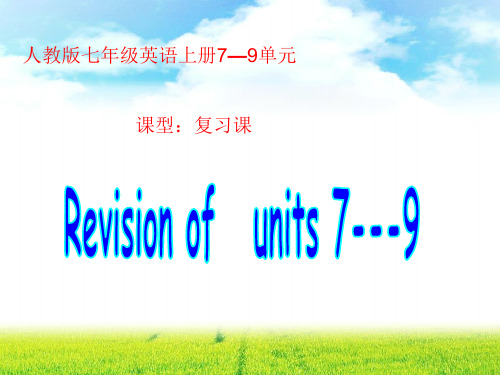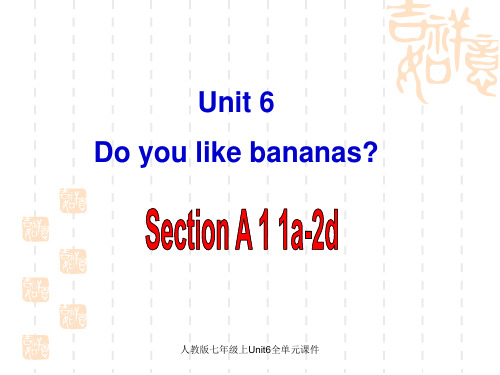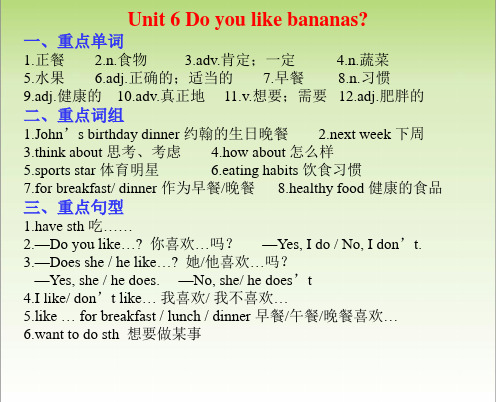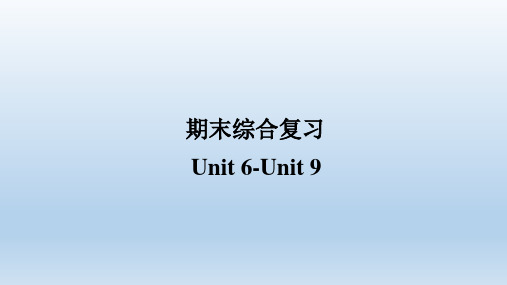人教新目标英语七年级上册Unit6-Unit9单元复习课件
合集下载
Unit9 重点知识复习课件 人教版英语七年级上册

人教版英语七年级上单元重点知识复习课件
Unit 9 My favorite subject is science.
基础夯实
【重点单词短语过关】 读一读 背一背
favorite /'feivərit/ adj.&n.特别喜爱的 (人或事物) subject /'sʌbdʒekt/ n. 学科;科目 science /'saiəns/ n. 科学
单词和短语精讲
(4)连接两个不同的名词,如:She moved from a house to a building. 她从平房搬到了楼房。 It’s quite a long way from Beijing to Guangzhou.从北京到广州有很长一段路。 (5)连接两个反义的名词,如:We’ve been working from morning to night. 我们从早工作到晚。 (含有这种搭配的词组还有:from first to last自始自终;from start to finish从开始到结束;from beginning to end从头到尾;自始自终;全部 ;from top to bottom从头到尾;从顶到底) (6)接表示地点的副词和名词,如:It’s only two hundred metres from here to my home. 从这里 到我家仅有两百米远。
单词和短语Leabharlann 讲3.from...to... 从......到......的用法。 from…to…”是英语中极其常用的介词短语,表示“从…到…”,其用法很多,搭配能力也很 强。本文现就其搭配形式归纳如下: (1)连接两个不同的数词 例如: Can you count from one to a hundred? 你能从一数到一百吗? Men from 16 to 30 are to be drafted into the army. 16岁到30岁的男子均应该应征入伍。 (2)接两个不同的数字,用于复数名词前, 例如:The work should take us from two to three hours. 这工作要用去我们2至3小时。 The nursery is open to children from 2 to 6 years old. 这所幼儿园对2岁到6岁之间的儿童 (3)连接两个相同的名词 例如:The paper was passed from hand to hand. 这份文件从一个人手里传到另一个手里。
Unit 9 My favorite subject is science.
基础夯实
【重点单词短语过关】 读一读 背一背
favorite /'feivərit/ adj.&n.特别喜爱的 (人或事物) subject /'sʌbdʒekt/ n. 学科;科目 science /'saiəns/ n. 科学
单词和短语精讲
(4)连接两个不同的名词,如:She moved from a house to a building. 她从平房搬到了楼房。 It’s quite a long way from Beijing to Guangzhou.从北京到广州有很长一段路。 (5)连接两个反义的名词,如:We’ve been working from morning to night. 我们从早工作到晚。 (含有这种搭配的词组还有:from first to last自始自终;from start to finish从开始到结束;from beginning to end从头到尾;自始自终;全部 ;from top to bottom从头到尾;从顶到底) (6)接表示地点的副词和名词,如:It’s only two hundred metres from here to my home. 从这里 到我家仅有两百米远。
单词和短语Leabharlann 讲3.from...to... 从......到......的用法。 from…to…”是英语中极其常用的介词短语,表示“从…到…”,其用法很多,搭配能力也很 强。本文现就其搭配形式归纳如下: (1)连接两个不同的数词 例如: Can you count from one to a hundred? 你能从一数到一百吗? Men from 16 to 30 are to be drafted into the army. 16岁到30岁的男子均应该应征入伍。 (2)接两个不同的数字,用于复数名词前, 例如:The work should take us from two to three hours. 这工作要用去我们2至3小时。 The nursery is open to children from 2 to 6 years old. 这所幼儿园对2岁到6岁之间的儿童 (3)连接两个相同的名词 例如:The paper was passed from hand to hand. 这份文件从一个人手里传到另一个手里。
人教版七年级英语上册7—9单元复习课件(共20张PPT)

❖
11、人总是珍惜为得到。2021/6/252021/6/252021/6/25Jun-2125-Jun-21
❖
12、人乱于心,不宽余请。2021/6/252021/6/252021/6/25Fri day, June 25, 2021
❖
13、生气是拿别人做错的事来惩罚自 己。2021/6/252021/6/252021/6/252021/6/256/25/2021
Made the first record(制作唱片
): 2008.10.16
………………..
Deng Ziqi is a……..singer . …….
2021/6/20
18
Homework
1.Review units10---12 2.Write a composition about Deng Ziqi
Mrs. Li: Good idea.
Clerk: What color do you want?
Mrs. Li: My son likes red, do you have red T-shirts?
Clerk: Sorry, we don't have red ones. What about the blue one?
13
三。单项选择
1. I was born ____A____ 1996 .9.2
A. on B. in C. to D. with
2. -- Does he often __B_ her homework in the evening?
No,He often __it after school.
人教版七年级英语上册7—9单元 课型:复习课
Brainstorm(头脑风暴) Spell the word one by one(依次快速拼读单词,一个单词一分)
最新人教版七年级上Unit6全单元课件

2 A: Do you like salad? B: No, I don’t. A: Do you like bananas?
1 B: Yes, I do. A: Do you like oranges?
3 B: Yes, I do.
人教版七年级上Unit6全单元课件
1c Practice the conversations above with your partner. Then make your own conversations.
Bill: Sounds good. John likes hamburgers.
Jack: Oh, I don’t like salad. Bill: But John likes salad,
and it’s his birthday. Jack: Yes, you’re right.
What about the fruit? Tom: I think John likes strawberries and apples. Bill: OK. Let’s have strawberries and apples then.
人教版七年级上Unit6全单元课件
2d Role-play the conversation.
Jack: Hey, John’s birth day dinner is next week. Let’s think about the food.
Tom: Sure. How about burgers, vegetable salad, and some fruit?
strawberry --- strawberries
rice
tomato ---- tomatoes
1 B: Yes, I do. A: Do you like oranges?
3 B: Yes, I do.
人教版七年级上Unit6全单元课件
1c Practice the conversations above with your partner. Then make your own conversations.
Bill: Sounds good. John likes hamburgers.
Jack: Oh, I don’t like salad. Bill: But John likes salad,
and it’s his birthday. Jack: Yes, you’re right.
What about the fruit? Tom: I think John likes strawberries and apples. Bill: OK. Let’s have strawberries and apples then.
人教版七年级上Unit6全单元课件
2d Role-play the conversation.
Jack: Hey, John’s birth day dinner is next week. Let’s think about the food.
Tom: Sure. How about burgers, vegetable salad, and some fruit?
strawberry --- strawberries
rice
tomato ---- tomatoes
Units 6-9单元知识点汇总课件 2021-2022学年人教版英语七年级上册

6.want to do sth 想要做某事
四、语法
(一)want的用法:want意为“想要、需要” ①want sth 想要某物。I want an apple. ②want to do sth想要做某事。I want to eat an apple. ③want sb to do sth. 想要某人做某事。
I want you to help me.
(二)like的用法:like及物动词,喜欢 ①like sb / sth. 喜欢某人/某物。 I like this pen. ②like to do sth. 喜欢做某事。 She likes to play with her friends. ③like doing sth.喜欢某事。
②—Hi, Alan. Happy birthday! 你好,艾伦。生日快乐!
—Thank you, Bill.
谢谢你,比尔。
③Well, do you want to come to my birthday party? 噢,你想来参加我的生
日聚会吗?
④—How old are you,Grace? 格蕾丝,你多大了?
6.need的用法: ①need做实义动词,有人称和数的变化 They don’t need our help. 他们不需要我们帮助。 Jim’s bike is broken. He needs to buy a new one. 吉姆的自行车坏了, 他需要买辆新的。 ②need做情态动词时常用于否定句和疑问句中,后接动词原形,无 人称和数的变化,可以直接加not构成否定句,也可直接提到句首变 为一般疑问句。 You needn’t worry about that. 你不必为此担心。 Need we finish the work before Saturday?我们有必要周六前完成工作 吗?
人教版七年级英语上册第六单元全单元ppt课件

Period 2
• birthday 生日
right正确的,适当的
• dinner 晚餐
apple 苹果
• week 周,星期
then 那么
• think about 思考,思索 egg 蛋,鸡蛋
• food 食物
carrot 胡萝卜
• sure 当然,肯定,一定 chicken 鸡肉
• How about …怎么样? so 那么
• eg: I like oranges.我喜欢橙子。
He likes ice-cream.他喜欢冰淇淋。
we don't like hamburgers.我们不喜欢汉堡。 He doesn't like vegetables.他不喜欢蔬菜。
She likes bread,but she doesn't like oranges.
vegetables:
西瓜
__c_a_rr_o_t___to_m__a_to___p_o_t_at_o__o_n_i_on____b_r_o_c_co_li
土豆 洋葱 西兰花
1c Listen and circle the food you hear in1a.
rice
salad
eggs
apple ice-cream hamburger
Key words
morning
noon
evening
breakfast /`brekfəst/
lunch /`lΛntſ / dinner /`dinə/
star • eat • well • habit • healthy
明星,星星 吃 好,令人满意的 习惯 健康的
初中人教版新目标英语七年级上册课件Unit6-SA

过去时态
描述已经发生的动 作或状态
形容词和副词
形容词的用法
用于描述名词的特征或性质
副词的用法
用于修饰动词、形容词或其他 副词
比较级与最高级
用于比较不同事物的程度或水 平
01 常用介词
指在语言中常见的位置或方向的介词
02 连词的分类
连接句子内部或句子之间的词语
03 介词短语和连词短语的使用
在句子中起到修饰或连接的作用
能力。
提高理解能力
通过不断阅读和解 析文章,逐渐提高 对语言表达和逻辑 推理的理解能力。
阅读不同领域 的文章
拓展阅读领域,可 以帮助提高对不同 主题的理解能力,
增加知识面。
01 阅读报纸
通过阅读报纸了解时事动态,丰富知识储备,提高 对社会事件的了解能力。
02 阅读故事书
阅读故事书可以激发阅读兴趣,培养想象力,提高 语言表达能力。
Practice using the following sentences to improve your grammar skills: 1. I like playing football. 2. She goes to school by bus. 3. They have lunch at 12 o'clock.
happening at the moment
of speaking.
Comparative and Superlative DAesdcrjiebicntgitvhee dsegree of a
quality or characteristic in
relation to others.
句子练习
03
总结
通过交流互动这一环节,学生们不仅可以提高自己的口语表 达能力和演讲技巧,还能培养团队合作精神和自信心。这对 于学生们的成长和发展至关重要,也是英语学习的必经之路。
新目标英语七年级上unit6单元课件(好用)

The theme aims to introduce students to different cultures and traditions, as well as to enhance their understanding of the world.
Unit Objectives
Students will develop their speaking, listening, reading, writing, and grammar skills through this unit.
结合实际情境运用词汇和语法
VS
为了让学生更好地掌握和运用所学的 词汇和语法知识,教师可以设计一些 结合实际情境的练习和活动,如角色 扮演、情景对话等。通过这些活动, 学生可以在模拟的真实环境中运用所 学的词汇和语法知识,加深对语言的 理解和记忆。
The Application of Vocabulary and Grammar
Overview of Unit Content
• The unit will cover various festivals and celebrations, including traditional festivals like Chinese New Year, Diwali, and Oktoberfest, as well as modern festivals like Earth Day and Black History Month.
Writing style
Discuss the writing style used in the text, including the author's choice of words, sentence variety, and effective use of language.
Unit Objectives
Students will develop their speaking, listening, reading, writing, and grammar skills through this unit.
结合实际情境运用词汇和语法
VS
为了让学生更好地掌握和运用所学的 词汇和语法知识,教师可以设计一些 结合实际情境的练习和活动,如角色 扮演、情景对话等。通过这些活动, 学生可以在模拟的真实环境中运用所 学的词汇和语法知识,加深对语言的 理解和记忆。
The Application of Vocabulary and Grammar
Overview of Unit Content
• The unit will cover various festivals and celebrations, including traditional festivals like Chinese New Year, Diwali, and Oktoberfest, as well as modern festivals like Earth Day and Black History Month.
Writing style
Discuss the writing style used in the text, including the author's choice of words, sentence variety, and effective use of language.
新目标七年级(上)unit6单元课件

详细描述
教师需要对学生的作业完成情况进行定期检 查,评估他们的学习成果和作业质量。对于 正确率,教师需要统计学生的答题正确率, 以了解学生对知识的掌握程度。对于完成质 量,教师应关注学生的作业是否整洁、规范, 以及是否符合要求。
单元测试与反馈
总结词
通过单元测试评估学生对本单元知识的掌握 程度,并提供反馈。
增加互动环节
在课件中增加互动环节,如小组 讨论、角色扮演等,提高学生的 参与度。
80%
多样化教学手段
采用多种教学手段,如视频、音 频、图片等,激发学生的学习兴 趣。
学生反馈与调整
学生意见收集
通过问卷调查、面对面交流等 方式,收集学生对课件的意见 和建议。
调整课件内容
根据学生的反馈,对课件内容 进行相应的调整,以满足学生 的需求。
04
单元评估与反馈
课堂表现评估
总结词
观察学生在课堂上的参与度、回答问 题的准确性和表达能力。
详细描述
教师在课堂上通过观察学生的参与情况, 评估他们的学习态度和课堂表现。对于回 答问题,教师应注意学生的答案是否准确 、思路是否清晰,以及表达是否流畅。
作业完成情况评估
总结词
检查学生作业的完成情况、正确率和完成质 量。
新目标七年级(上)Unit6单元 课件
目
CONTENCT
录
• 单元教学目标 • 单元教学内容 • 教学方法与手段 • 单元评估与反馈 • 教学反思与改进
01
单元教学目标
知识目标
掌握本单元的重点词汇和短语,如“go to the movies”, “last weekend”, “on the weekend”等。
Байду номын сангаас 03
(复习全案)七年级英语上册-Unit-9(基础知识梳理+能力提升训练)精品课件-(新版)人教新目标版

第15页,共24页。
英语·新课标(RJ)
┃ 能力提升训练
( A )6. A. teacher B. student
eakfast B. dinner
C. lunch
D. fruit
(
C )8.
A.
C.
not
don't
B. doesn't
( C )7. Our teacher always plays games ________ us.
A. at B. for C. with D. in
( D )8. —I like biology and history.
—Why do you like________?
A.they B. it C. their D. them
7. 最喜欢的 ____f_a_v_o_r_i_t_e 8. 音乐 _________music
9. 妙极了;酷的 ____c_o_o_l 10. 有用的 _______u_s_e_ful
11. 星期日 ___S_u_n_d_a_y_
12. 星期二 ___T_u_e_s_d_a_y_
第2页,共24页。
19. hour ___小__时__
20. Saturday _________星期六
21. from ___从___…_…_开__始__ 22. Chinese _______ 汉语
23. history __历__史___
24. math _____数__学
25.why __为__什__么__
第3页,共24页。
提问)
__Wh_e_n__ do ___y_o_u__ ___h_av_e__ science?
人教版英语七年级上册期末复习:Unit 6-Unit 9 课件(共31张PPT)

Grammar
基数词
1. one 到 twelve需要特殊记; 2. 13到19结尾加teen,但要注意thirteen, fifteen,
eighteen; 3. 整十位数结尾加ty,注意forty; 4.表示“几十几”时,在整十位数和个位之间,加 短横连,如:fifty-five; 5. 百位和十位、个位之间,and连接。
在清辅音后读/s/ (清-清);在浊辅音和元音后读 /z/ (浊-浊);在/s/, /z/等后读/iz/
写出下列动词的三单形式
take be like play swim takes is/am likes plays swims run do eat watch see runs does eats watches sees lose think go have want loses thinks goes has wants study help learn teach find studies helps learns teaches finds
• 5.他弟弟不喜欢冰淇凌.
His brother doesn’t like ice-cream.
• 6.她喜欢蔬菜吗?
Does she like vegetables?
• 7.让我们吃些鸡肉吧.
Let’s have some chicken.
• 8.你爸爸午餐吃什么?
What does your father have for lunch?
Vegetables: carrot, broccoli, tomato, potato
1.-What do you have for breakfast? -I have some milk, an egg and some bread.
人教新目标英语七年级上册 Unit6-Unit9 单元复习课件(共45张PPT)

• 1.我喜欢沙拉. I like salad.
• 2.他们不喜欢西红柿.
They don’t like tomatoes. • 3.我父母喜欢健康食品.
My parents like healthy food. • 4.我妹妹喜欢草莓.
My sister likes strawberries. • 5.他弟弟不喜欢冰淇凌.
在清辅音后读/s/;(清-清) 在浊辅音和元音后读/z/;(浊-浊) 在/s/, /z/等后读/iz/.
• 写出下列动词的三单形式:
take be like play swim takes is/am likes plays swims run do eat watch see runs does eats watches sees lose think go have want loses thinks goes has wants study help learn teach find studies helps learns teaches finds
Answers: 11. going 12. watching 13. sing 14. to join 15. doing 16. do
17. watching 18. Do, study 19. Does, have
Unit 7
coat
shorts
pants (trousers) shirt
• 9.你哥哥喜欢什么食物? What food does your brother like?
• 10.你喜欢水果吗? Do you like fruit?
• 11.他们喜欢吃汉堡作为早餐. They like having hamburgers for breakfast. • 12.我不喜欢沙拉和冰淇凌.
- 1、下载文档前请自行甄别文档内容的完整性,平台不提供额外的编辑、内容补充、找答案等附加服务。
- 2、"仅部分预览"的文档,不可在线预览部分如存在完整性等问题,可反馈申请退款(可完整预览的文档不适用该条件!)。
- 3、如文档侵犯您的权益,请联系客服反馈,我们会尽快为您处理(人工客服工作时间:9:00-18:30)。
Vegetables: carrot, broccoli, tomato, potato
-What do you have for breakfast? -I have some milk, an egg and some bread.
-What (food) do you like (best)? -I like chicken (best).
-Do you have a tennis ball? -Yes, I do./No, I don’t.
-Do you like salad? -Yes, I do. I like… /No, I don’t. I don’t like…
-Does he/she have a ping-pong ball? -Yes, he/she does. / No, he/she doesn’t.
-Does he/she like apples? -Yes, he/she does. He/She likes… /No, he/she doesn’t. He/She doesn’t like…
• 1.一些鸡肉
some chicken
• 2.五个西红柿 five tomatoes
• 3.一些薯条
16.for yourself
17.运动鞋
17.sports shoes
18.…的价格
18.the price of…
19.把某物卖给某人 19.sell sth. to sb.
20.给某人买某物 20.buy sth. for sb.
21.看一看
21.have a look (at)
22.出售
22.on sale
道谢 ----Thanks a lot.
Thank you very much. ----That’s OK.
That’s all right. You’re welcome. It’s my pleasure.
1.多少钱 2.七美元
Answers: 1.how much
3.五元钱
2.seven dollars
Answers: 11. going 12. watching 13. sing 14. to join 15. doing 16. do
17. watching 18. Do, study 19. Does, have
Unit 7
coat
shorts
pants (trousers) shirt
11.两条黄绿相间的裙子 11.two yellow and green skirts
12.一件黑色的短体恤衫 12.a short black T-shirt
13.什么颜色
13.what color
14.给你.
14.Her.in red skirt
16.亲自
His brother doesn’t like ice-cream.
• 6.她喜欢蔬菜吗? Does she like vegetables?
• 7.让我们吃些鸡肉吧. Let’s have some chicken.
• 8.你爸爸午餐吃什么? What does your father have for lunch?
4.那些红色的帽子多少钱? How much are those red hats?
thirty thirty-one … thirty-nine
fourteen forty forty-one … forty-nine
fifteen
fifty
fifty-one … fifty-nine
sixteen
sixty sixty-one … sixty-nine
seventeen seventy seventy-one … seventy-nine
1.红体恤多少钱? How much is the red T-shirt? What’s the price of the T-shirt?
2.它是28美元. It’s 28 dollars .
3.这些黑裤子多少钱? How much are these black pants? What’s the price of these black pants?
I don’t like salad or ice cream. • 13.他不喜欢蔬菜,但他喜欢水果. He doesn’t like vegetables, but he likes fruit. • 14.她喜欢打排球.
She likes playing volleyball. • 15.她吃汉堡和梨作为晚餐. She has hamburgers and pears for dinner.
在清辅音后读/s/;(清-清) 在浊辅音和元音后读/z/;(浊-浊) 在/s/, /z/等后读/iz/.
• 写出下列动词的三单形式:
take be like play swim takes is/am likes plays swims run do eat watch see runs does eats watches sees lose think go have want loses thinks goes has wants study help learn teach find studies helps learns teaches finds
动词原形变单三的变化规则:
1. 一般情况下在动词后加s 。 like→ likes (“元音字母+ y”结尾的动词, 直接 play → plays
加 s.) 2.以辅音字母 + y 结尾的动词,变y study → studies 为i再加es。 3.以s,x,ch,sh结尾的动词加es。 teach → teaches
Answers: 1.know 2.go 3es 4.have 5.plays 6.teaches 7.do 8.has 9.Do,have 10.don’t like
11.What about ____(go) to the shop? 12. Bob likes ____(watch) TV. 13. Let’s ____( sing) an English song. 14. I want ____(join) the soccer club. 15. After I finish __( do) my homework, I go shopping. 16. John often helps his mother__ (do) the housework. 17. I think ____ (watch) TV is boring. 18.__Tom and his brother ___ (study) in Beijing? 19.____ your brother _____(have) a son?
some French fries
• 4.许多汉堡 many / lots of hamburgers
• 5.八个草莓
eight strawberries
• 6.一些冰激凌 some ice-cream
• 7.四块手表
four watches
• 8.二串钥匙
two sets of keys
• 9.吃早餐 have breakfast • 10.就午餐而言 for lunch • 11.一个体育明星 a sports star • 12.健康食品 healthy food • 13.一本有趣的书 an interesting book • 14.怎样 / 如何 how about /what about • 15.不健康的食品 unhealthy food
4.她的鞋
3.five yuan
5.杰姆的白色袜子
4.her shoes
6.我妹妹的短裤 7.两条裤子 8.两个小包 9.一件红色的长毛衣 10.一顶蓝色的大帽子
5.Jim’s white socks 6.my sister’s shorts 7.two pairs of trousers 8.two small bags 9.a long red sweater 10.a big blue hat
3. 整十位数结尾加ty,注意forty;
4.表示“几十几”时,在整十位数和个位之间,加 短横连,如:fifty-five;
5. 百位和十位、个位之间, and连。
A: Can I help you? (What can I do for you?) B: Yes, please. I want a sweater. A: What color do you want? A: Blue. B: What size do you need? A: Size L. B: Here you are. A: Can I try it on? B: Certainly. A: It looks very nice. How much is it? B: 300 yuan. A: Here is the money. B: Thank you.
用动词的适当形式填空。 1.I __ (know) the boy. 2.They __ (go) to work on Saturdays. 3.He usually ___(come) to school early. 4.I often ___ (have) rice, meat and vegetables. 5.My grandfather __(play) sports in the park. 6.Miss Li __(teach) English in our school. 7.Alice and Jenny __ (do) homework after school. 8.Her sister ___ (have) Chinese every day. 9.___ you ___ (have) a soccer ball﹖ 10.I ___ ( not ,like) playing computer games.
-What do you have for breakfast? -I have some milk, an egg and some bread.
-What (food) do you like (best)? -I like chicken (best).
-Do you have a tennis ball? -Yes, I do./No, I don’t.
-Do you like salad? -Yes, I do. I like… /No, I don’t. I don’t like…
-Does he/she have a ping-pong ball? -Yes, he/she does. / No, he/she doesn’t.
-Does he/she like apples? -Yes, he/she does. He/She likes… /No, he/she doesn’t. He/She doesn’t like…
• 1.一些鸡肉
some chicken
• 2.五个西红柿 five tomatoes
• 3.一些薯条
16.for yourself
17.运动鞋
17.sports shoes
18.…的价格
18.the price of…
19.把某物卖给某人 19.sell sth. to sb.
20.给某人买某物 20.buy sth. for sb.
21.看一看
21.have a look (at)
22.出售
22.on sale
道谢 ----Thanks a lot.
Thank you very much. ----That’s OK.
That’s all right. You’re welcome. It’s my pleasure.
1.多少钱 2.七美元
Answers: 1.how much
3.五元钱
2.seven dollars
Answers: 11. going 12. watching 13. sing 14. to join 15. doing 16. do
17. watching 18. Do, study 19. Does, have
Unit 7
coat
shorts
pants (trousers) shirt
11.两条黄绿相间的裙子 11.two yellow and green skirts
12.一件黑色的短体恤衫 12.a short black T-shirt
13.什么颜色
13.what color
14.给你.
14.Her.in red skirt
16.亲自
His brother doesn’t like ice-cream.
• 6.她喜欢蔬菜吗? Does she like vegetables?
• 7.让我们吃些鸡肉吧. Let’s have some chicken.
• 8.你爸爸午餐吃什么? What does your father have for lunch?
4.那些红色的帽子多少钱? How much are those red hats?
thirty thirty-one … thirty-nine
fourteen forty forty-one … forty-nine
fifteen
fifty
fifty-one … fifty-nine
sixteen
sixty sixty-one … sixty-nine
seventeen seventy seventy-one … seventy-nine
1.红体恤多少钱? How much is the red T-shirt? What’s the price of the T-shirt?
2.它是28美元. It’s 28 dollars .
3.这些黑裤子多少钱? How much are these black pants? What’s the price of these black pants?
I don’t like salad or ice cream. • 13.他不喜欢蔬菜,但他喜欢水果. He doesn’t like vegetables, but he likes fruit. • 14.她喜欢打排球.
She likes playing volleyball. • 15.她吃汉堡和梨作为晚餐. She has hamburgers and pears for dinner.
在清辅音后读/s/;(清-清) 在浊辅音和元音后读/z/;(浊-浊) 在/s/, /z/等后读/iz/.
• 写出下列动词的三单形式:
take be like play swim takes is/am likes plays swims run do eat watch see runs does eats watches sees lose think go have want loses thinks goes has wants study help learn teach find studies helps learns teaches finds
动词原形变单三的变化规则:
1. 一般情况下在动词后加s 。 like→ likes (“元音字母+ y”结尾的动词, 直接 play → plays
加 s.) 2.以辅音字母 + y 结尾的动词,变y study → studies 为i再加es。 3.以s,x,ch,sh结尾的动词加es。 teach → teaches
Answers: 1.know 2.go 3es 4.have 5.plays 6.teaches 7.do 8.has 9.Do,have 10.don’t like
11.What about ____(go) to the shop? 12. Bob likes ____(watch) TV. 13. Let’s ____( sing) an English song. 14. I want ____(join) the soccer club. 15. After I finish __( do) my homework, I go shopping. 16. John often helps his mother__ (do) the housework. 17. I think ____ (watch) TV is boring. 18.__Tom and his brother ___ (study) in Beijing? 19.____ your brother _____(have) a son?
some French fries
• 4.许多汉堡 many / lots of hamburgers
• 5.八个草莓
eight strawberries
• 6.一些冰激凌 some ice-cream
• 7.四块手表
four watches
• 8.二串钥匙
two sets of keys
• 9.吃早餐 have breakfast • 10.就午餐而言 for lunch • 11.一个体育明星 a sports star • 12.健康食品 healthy food • 13.一本有趣的书 an interesting book • 14.怎样 / 如何 how about /what about • 15.不健康的食品 unhealthy food
4.她的鞋
3.five yuan
5.杰姆的白色袜子
4.her shoes
6.我妹妹的短裤 7.两条裤子 8.两个小包 9.一件红色的长毛衣 10.一顶蓝色的大帽子
5.Jim’s white socks 6.my sister’s shorts 7.two pairs of trousers 8.two small bags 9.a long red sweater 10.a big blue hat
3. 整十位数结尾加ty,注意forty;
4.表示“几十几”时,在整十位数和个位之间,加 短横连,如:fifty-five;
5. 百位和十位、个位之间, and连。
A: Can I help you? (What can I do for you?) B: Yes, please. I want a sweater. A: What color do you want? A: Blue. B: What size do you need? A: Size L. B: Here you are. A: Can I try it on? B: Certainly. A: It looks very nice. How much is it? B: 300 yuan. A: Here is the money. B: Thank you.
用动词的适当形式填空。 1.I __ (know) the boy. 2.They __ (go) to work on Saturdays. 3.He usually ___(come) to school early. 4.I often ___ (have) rice, meat and vegetables. 5.My grandfather __(play) sports in the park. 6.Miss Li __(teach) English in our school. 7.Alice and Jenny __ (do) homework after school. 8.Her sister ___ (have) Chinese every day. 9.___ you ___ (have) a soccer ball﹖ 10.I ___ ( not ,like) playing computer games.
